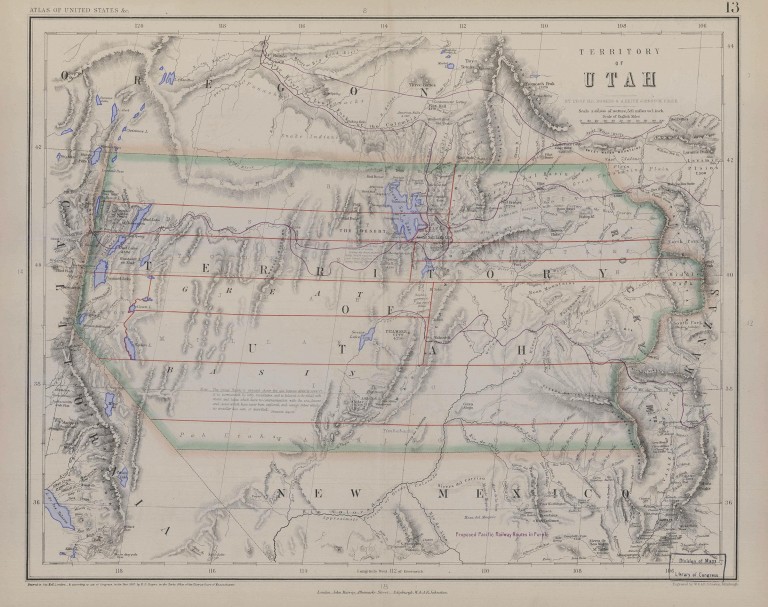What was Utah before it was called Utah?
If you go way back, Utah was inhabited by the Fremont people. Later, various native American tribes spanned Utah. Then during the colonialism territory was owned by Spain and became Mexico. The US won the territory in the 1848 war. As a reminder, the pioneers arrived in 1847 when it was still part of Mexico. Brigham Young attempted to create a territory called “Deseret“. Deseret took up much of what we know today as Utah, Nevada, and Arizona, along with parts of all the other surrounding states. Over time, this territory was reduced to the Utah Territory, then to what we know today as the state of Utah.
Here are some maps from Wikipedia that show the evolution of Utah and the United States.












The name Utah appears to have originated as part of the 1850 Compromise. The territory of Deseret was majority occupied by Mormons who practiced polygamy. In the compromise, several territories were created and renamed. Utah was one of them.

History of the name Utah
- The name Utah derives from the name of the Ute tribe, meaning ‘people of the mountains’. However, no such word exists in the Utes’ language, and the Utes refer to themselves as Noochee. The meaning of Utes as ‘the mountain people’ has been attributed to the neighboring Pueblo Indians, as well as to the Apache word Yuttahih, which means ‘one that is higher up’ or ‘those that are higher up’. In Spanish, it was pronounced Yuta; subsequently, English-speaking people may have adapted the word as Utah. – Wikipedia
- The government found the “State of Deseret” to be an unsuitable name, and instead proposed the name “Utah.” The name Utah had appeared on maps as early as 1720 as yutta, an alternative spelling of Ute, one of the peoples indigenous to the region. – Library of Congress
- Utah: The riddle behind the name
Definition of the name Utah
- Quick Facts | Utah.gov
- The name “Utah” originates from the Native American “Ute” tribe which means people of the mountains.
- From the Apache word “yuttahih” meaning “one/those that is/are higher up”.
- Yuta – Indigenous Uto-Aztecan People of the Great Basin (UTE)
- Yudah – High in reference to in the mountains
- Jotab – Excellent for Water
- Yampa – Ute Indians who live south of the Unitahs. Yam in Hebrew means South
- Juttah – a Levitical City of people living in the mountains, birth place of John the Baptist
Pronunciation of the name Utah
- Utah
- juːtɑ
- YOO-tah
- juːtɔ
- YOO-taw
- Navajo: Áshįįh Biiʼtó Hahoodzo
Similarities to the name Utah
- Juttah
- Yatta
- Indian Names – Yutta – Yudah – Jutta – Judah
- Indian Names – Yudah – Yehuda
- Indian Names – Yutah – Eutaw
- Hebrew Names – Jutah – Juttah – Jotbah – Jatah
Scriptures referring to Utah
- Isaiah 2:2 And it shall come to pass in the last days, that the mountain of the Lord’s house shall be established in the top of the mountains, and shall be exalted above the hills; and all nations shall flow unto it.
Isn’t it interesting, the name, the meaning, the geography, the scripture, the similarities. There are a lot of parallels to consider.
Other Points on Utah
President Hinckley in October 2001 General Conference – Living in the Fulness of Times
The era in which we live is the fulness of times spoken of in the scriptures, when God has brought together all of the elements of previous dispensations. From the day that He and His Beloved Son manifested themselves to the boy Joseph, there has been a tremendous cascade of enlightenment poured out upon the world. The hearts of men have turned to their fathers in fulfillment of the words of Malachi. The vision of Joel has been fulfilled wherein he declared:
“And it shall come to pass afterward, that I will pour out my spirit upon all flesh; and your sons and your daughters shall prophesy, your old men shall dream dreams, your young men shall see visions:
“And also upon the servants and upon the handmaids in those days will I pour out my spirit.
“And I will shew wonders in the heavens and in the earth, blood, and fire, and pillars of smoke.
“The sun shall be turned into darkness, and the moon into blood, before the great and the terrible day of the Lord come.
“And it shall come to pass, that whosoever shall call on the name of the Lord shall be delivered: for in mount Zion and in Jerusalem shall be deliverance, as the Lord hath said, and in the remnant whom the Lord shall call” (Joel 2:28–32).
2nd Nephi 12:1-4
1 The word that Isaiah, the son of Amoz, saw concerning Judah and Jerusalem:
2 And it shall come to pass in the last days, when the mountain of the Lord’s [Temple] house shall be established in the top of the mountains [Utah], and shall be exalted above the hills, and all nations shall flow unto it.
3 And many people shall go and say, Come ye, and let us go up to the mountain of the Lord, to the house of the God of Jacob; and he will teach us of his ways, and we will walk in his paths; for out of Zion [Salt Lake / America] shall go forth the law, and the word of the Lord from Jerusalem [Utah].
2nd Nephi 12:1-4
1 The word that Isaiah, the son of Amoz, saw concerning Judah and Jerusalem:
How do you pronounce Judah in Hebrew?
Other References:
A Study in Hebrew and Indian Languages by Thomas W Brookbank – Ricks College Reburg, ID Sp. C-F PJ 4543 B76
Department of the Interior – Underground Water in the valleys of Utah Lake and Jordan River
Archives of Aboriginal Knowledge
